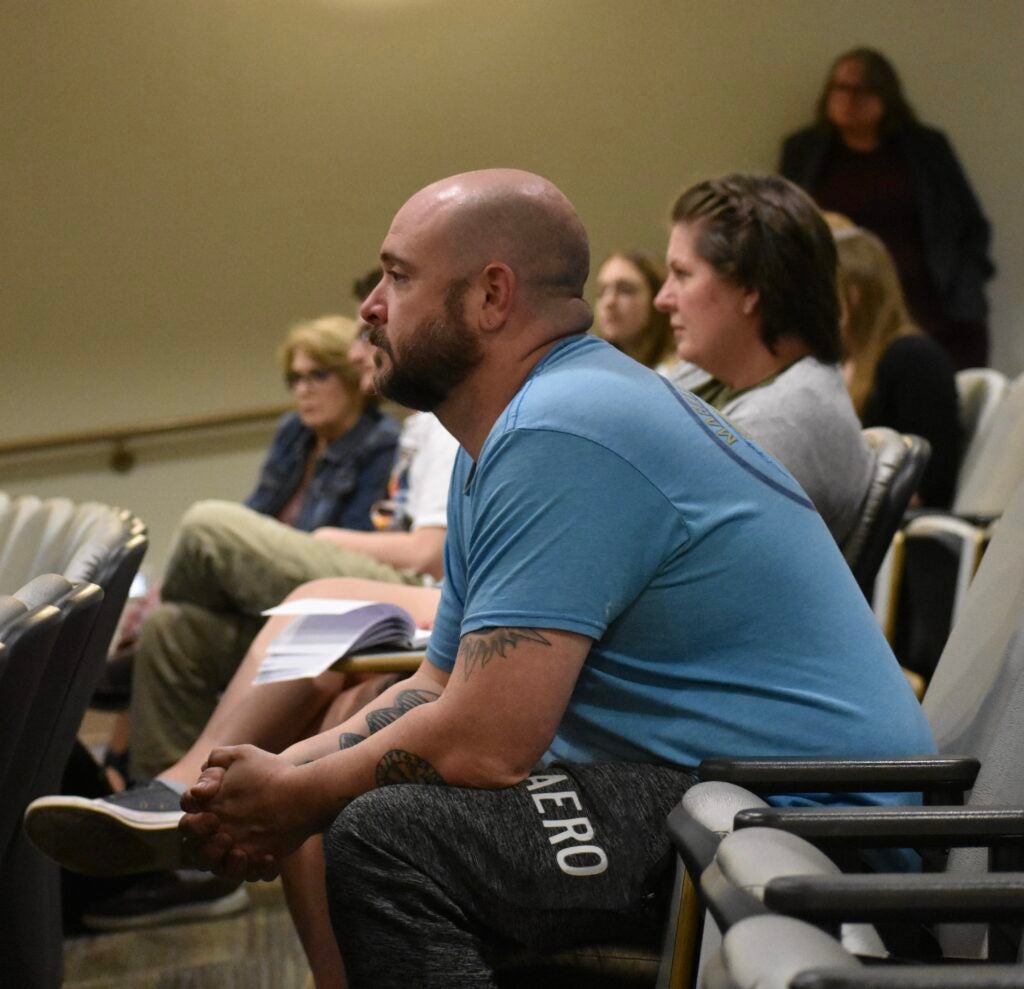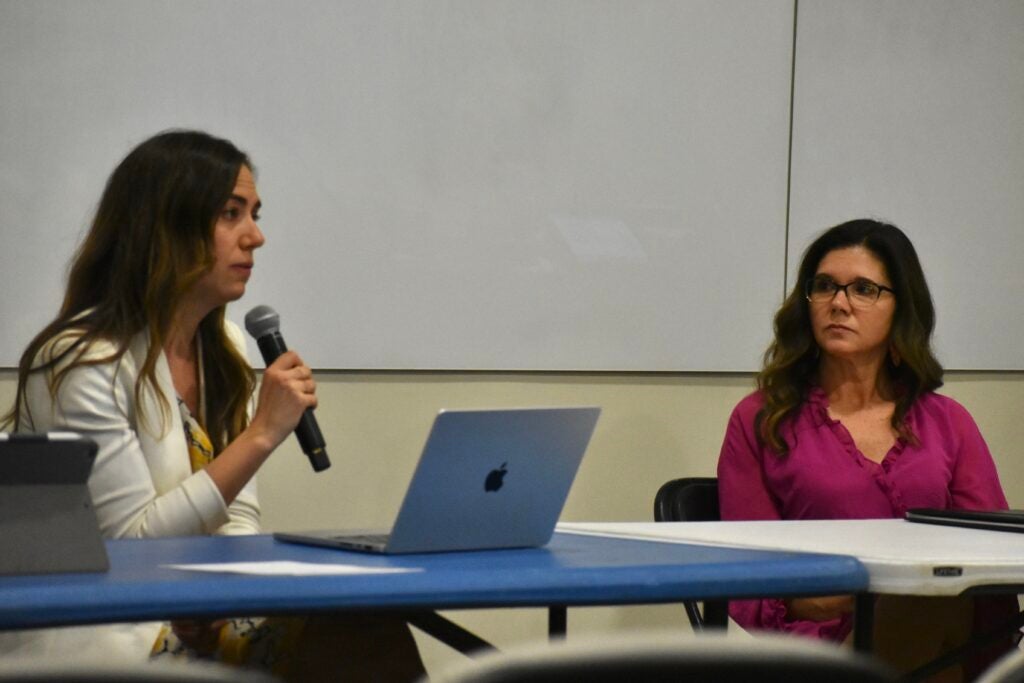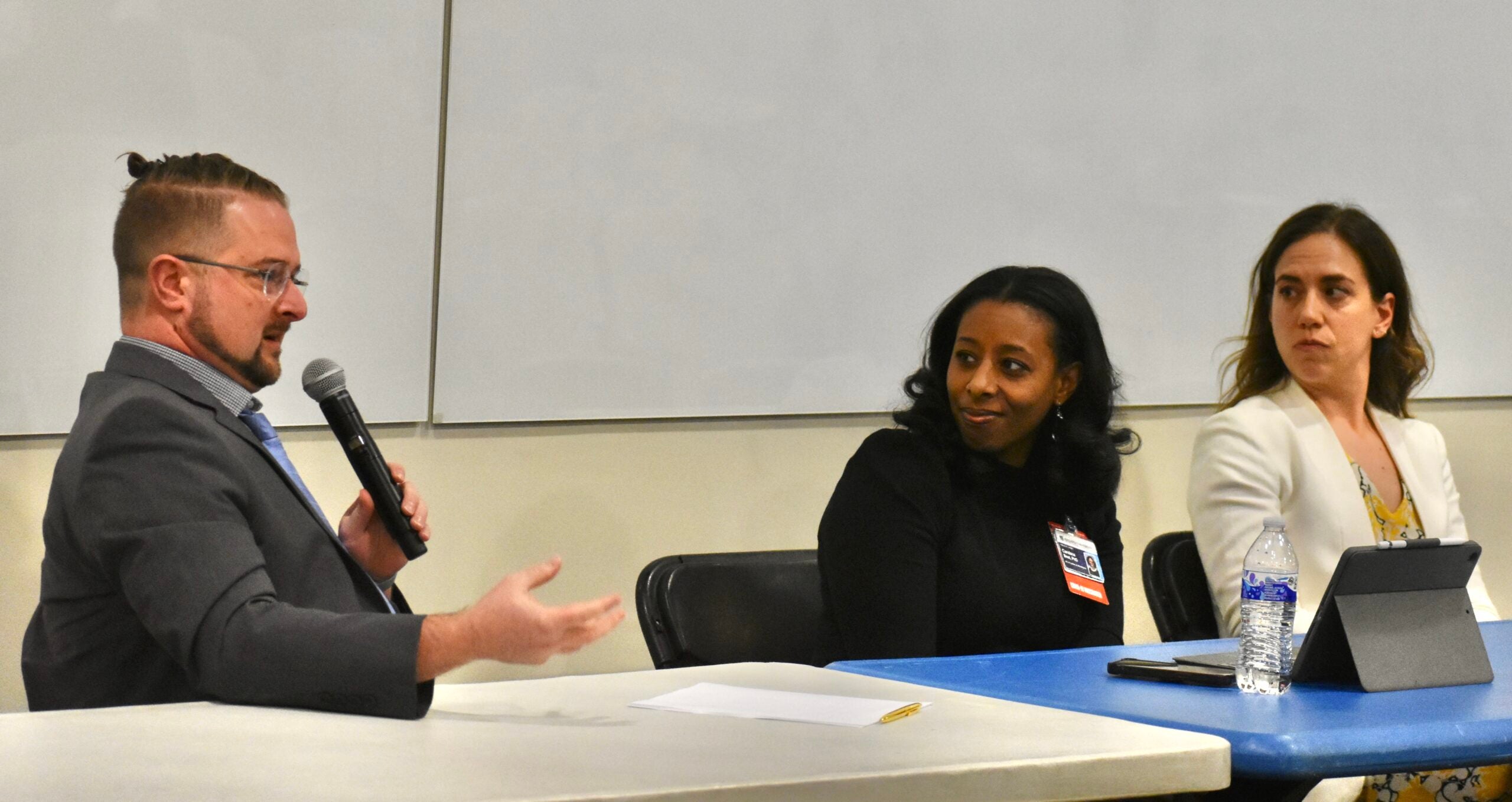Inviting four panelists with differing expertise, Augusta University’s Pamplin College of Arts, Humanities and Social Sciences hosted a public talk regarding the future of reproductive rights on March 23.
With local panelists Dr. Martha Ginn, Dr. Candace Best and the Rev. Nic Filzen and out-of-town guest speaker Dr. Erin Heidt-Forsythe from Penn State University, attendees were able to hear about various topics relating to reproductive rights and what each panelist viewed as a future problem following the U.S. Supreme Court’s ruling on the Dobbs v. Jackson case.
“So, after the Dobbs decision, many states have passed new laws regulating access to abortion, and it seems almost like they’re competing to see who can be the most extreme,” said Ginn, who is an Augusta University professor of social sciences. “Like South Carolina recently proposing that we give the death penalty for women who have abortions – that’s sort of a ‘hold my beer’ scenario.”
Ginn then went on to inform audience members about Georgia’s abortion law, which prohibits the procedure after six weeks from conception – unless the pregnant woman’s life is in jeopardy or her health could be “seriously damaged” if the fetus is likely to be born with “untreatable defects” or if the woman was sexually assaulted.
“The women has to be a legal resident of the state where she wants to get the abortion, her doctor has to consult with two other physicians and have them agree with him or her that [the patient] is eligible to get an abortion,” said Ginn. “The physician has to have and the physician has to perform the procedure at an accredible hospital, must be licensed by the State Board of Health and has to receive approval from a committee within the hospital responsible for approving abortions, but the law does not stipulate that the hospital has to have said committee – so if they don’t have said committee than she can’t get the approval, and therefore cannot have the abortion.”
Ginn said this shows how state legislators are creating “new and creative” ways to restrict access to abortions by reverting back to the 1968 reproductive rights law of the state, which came back into effect after Roe v. Wade was overturned.
“Roe is important because it established that a woman had a fundamental right to choose whether or not she wanted to have an abortion in that first trimester,” said Ginn. “Planned Parenthood v. Casey acknowledged that there are strong equality concerns to justify abortion rights; they argue that women cannot participate fully in socioeconomic life if they are forced to continue on with unwanted pregnancies.”
Ginn explained how the Dobbs case held that abortion is not outright addressed in the U.S. Constitution and is therefore a state right to police and prohibit – this has led to abortion laws being on a “state by state basis.”
“Ultimately, what Dobbs does is leaves a long list of unanswered, practical questions; can states ban women traveling to have an abortion in another state?” said Ginn. “The court has recognized the right to travel but, just like the right to privacy, it is not in the Constitution … How will they police abortion drugs? … so, just as Roe set off years of legal uncertainty, Dobbs has launched a whole new period where we’re just going to have to wait and see.”
Heidt-Forsythe, from Penn State’s Department of Political Science and Women’s Gender Studies, and Sexuality Studies, said restrictive abortion laws are related to various other aspects of life that may not be considered by most.

“Restrictions on abortion are connected to other restrictions on bodies, on bodily liberty and even the ability for people to have the families they want – not just prevent pregnancies that they don’t want,” she said. “We are living in a political, social and economic context where our autonomy around reproduction has never been more threatened … From being able to access abortion, to the ability to carry healthy pregnancies to term, to receiving fertility care if you in fact want to have a family, to allowing people to access gender-affirming care at all ages and receiving science-based sex education; I know I’m talking about a lot of different topics, but they are all connected to abortion, and our ability to have autonomy in our own bodies.”
Heidt-Forsythe, who specializes in studying policies regarding infertility and assisted reproductive technologies, said there has been a lot of worry in the community post-Dobbs.
“There are a lot of state personhood bills; for example bills that define personhood at the moment of conception might challenge people who want to do in vitro fertilization,” she said. “When you do IVF you bring eggs and sperm together, outside of the body, and you create an embryo. An embryo is an embryo whether it’s outside of the body or inside of the body, and a lot of people who use fertility treatments are rightfully worried that these kinds of personhood bills, which define life as the moment of conception, could also define life at the moment of IVF.”
While Heidt-Forsythe admits that these personhood bills have not been successful thus far by themselves, she emphasizes that abortion restrictions have been quite successful.
“A lot of these bills don’t explicitly mention in vitro fertilization …, but there is this gray space about what happens to these embryos that we create outside of the body,” she said. “There are statistics that show abortion bills are increasingly mentioning in vitro fertilization, but they don’t want to ban IVF.”
Heidt-Forsythe said legislators are attempting to pass abortion bans or they are being approved, with no explicit way to address how it affects IVF.
“What happens to embryos that we create? If we discard them is that abortion or ending life in some way?” she said. “A lot of lawmakers have been hedging that around if this in fact applies to IVF or not … There was some leaked audio of Brian Kemp in a campaign event where he said he believed that we should limit the destruction of embryos. Meaning that if you have extra embryos that you create via IVF, Brian Kemp, in that situation, believes that we should not be able to dispose of those embryos.”
“[The non-profit] Susan B. Anthony Pro-Life America believes that we need more ethical IVF; meaning we shouldn’t be able to create so many embryos,” she said. “So, essentially, IVF and abortion are two sides of the same coin.”
While she believes abortion is an important issue on its own, Heidt-Forsythe said she also believes it is connected to a multitude of dividing problems.
“I also think it’s associated with the unprecedented attacks on trans healthcare for adults and children,” she said. “I think it’s also intimately tied to rising rates of mortality and the treatment of mothers, especially mothers of color in this country.”

Best, a psychologist from the university’s Department of Psychological Sciences, said underserved, colored and poor communities are suffering greatly due to a variety of factors that also relate to banning or preventing abortions.
“Some of you may know that just last week, the CDC released a report highlighting that maternal mortality is increasing in the United States while it’s declining all over the world,” she said. “Underserved communities and women of color we are seeing rates that are three, four, five times higher, which is terrifying.”
Best said it is important for college students and other attendees to understand how women still die from pregnancy, and how the statistics look very grim.
“Georgia currently ranks 49 out of 50 states as far as women surviving pregnancy,” she said. “Something else that I think is important to recognize is that accessing contraception in this country is really difficult; over the counter contraception is not even available in the United States … but when you go to other countries around the world – Europe, Africa and South America – women have access to over-the-counter contraceptives. I think these are very important things that could greatly reduce the need for abortions.”
All speakers on the panel said they each believed abortion to be a problem that affects both men and women, and how men need to get more involved in learning about reproductive rights and fighting for them.
“Laws which control bodies and limit choices affect everybody; this is not just a women’s issue,” said Filzen, a reverend from the Universalist Church. “Think globally, act locally. I think that’s a really important thing to keep in mind. Reproductive justice work, like all justice work, starts out at the relational level and successful coalition building … The erosion of reproductive rights affects all of us. Revered Dr. Martin Luther King Jr. said, ‘Injustice anywhere is a threat to justice everywhere; we are caught in an inescapable network of mutuality tied in a single garment of destiny.’”
Afterwards, a Q&A was held and a reception followed to allow further conversation amongst colleagues, students, speakers and other attendees.












